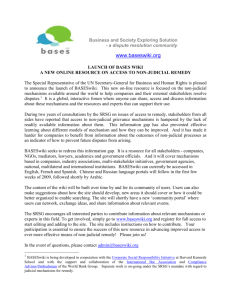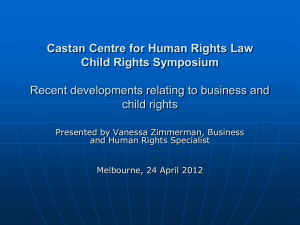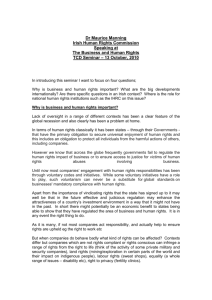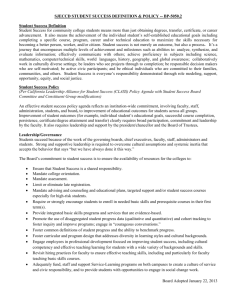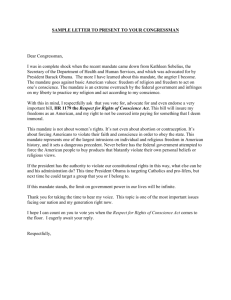advertisement
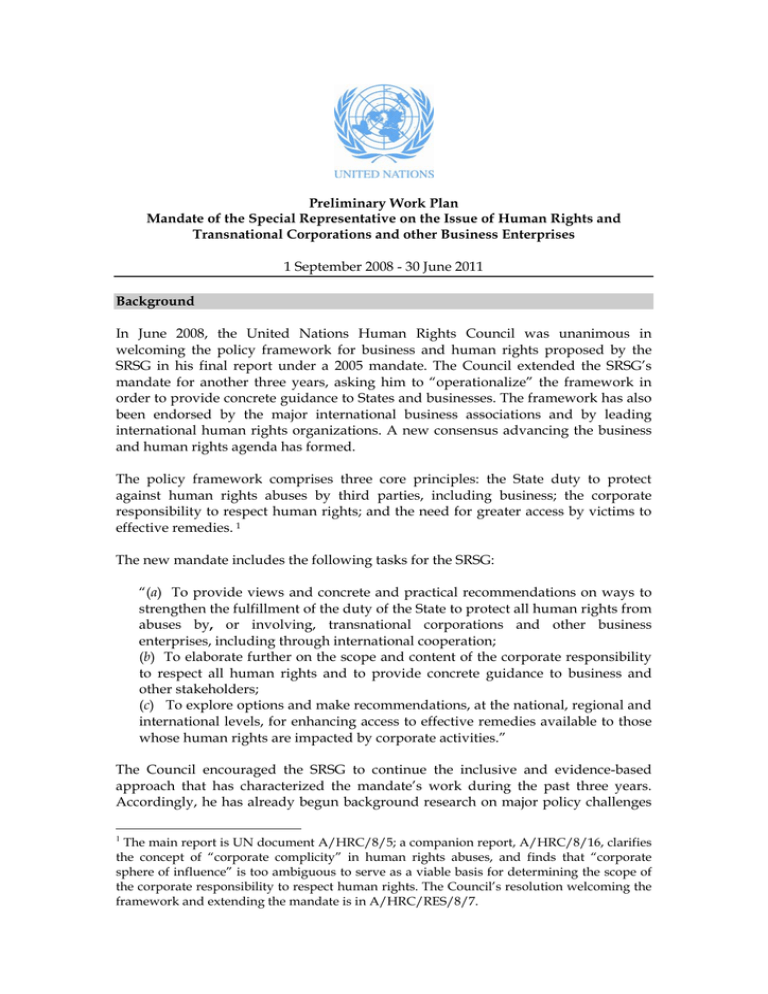
Preliminary Work Plan Mandate of the Special Representative on the Issue of Human Rights and Transnational Corporations and other Business Enterprises 1 September 2008 - 30 June 2011 Background In June 2008, the United Nations Human Rights Council was unanimous in welcoming the policy framework for business and human rights proposed by the SRSG in his final report under a 2005 mandate. The Council extended the SRSG’s mandate for another three years, asking him to “operationalize” the framework in order to provide concrete guidance to States and businesses. The framework has also been endorsed by the major international business associations and by leading international human rights organizations. A new consensus advancing the business and human rights agenda has formed. The policy framework comprises three core principles: the State duty to protect against human rights abuses by third parties, including business; the corporate responsibility to respect human rights; and the need for greater access by victims to effective remedies. 1 The new mandate includes the following tasks for the SRSG: “(a) To provide views and concrete and practical recommendations on ways to strengthen the fulfillment of the duty of the State to protect all human rights from abuses by, or involving, transnational corporations and other business enterprises, including through international cooperation; (b) To elaborate further on the scope and content of the corporate responsibility to respect all human rights and to provide concrete guidance to business and other stakeholders; (c) To explore options and make recommendations, at the national, regional and international levels, for enhancing access to effective remedies available to those whose human rights are impacted by corporate activities.” The Council encouraged the SRSG to continue the inclusive and evidence-based approach that has characterized the mandate’s work during the past three years. Accordingly, he has already begun background research on major policy challenges The main report is UN document A/HRC/8/5; a companion report, A/HRC/8/16, clarifies the concept of “corporate complicity” in human rights abuses, and finds that “corporate sphere of influence” is too ambiguous to serve as a viable basis for determining the scope of the corporate responsibility to respect human rights. The Council’s resolution welcoming the framework and extending the mandate is in A/HRC/RES/8/7. 1 and options. He is planning several regional consultations and expert workshops. He has convened a Leadership Group comprising eminent individuals from different sectors and regions of the world, to provide him with strategic and substantive advice on the overall direction of the mandate (the list of participants is appended). Also, pursuant to the Council resolution, the Office of the High Commissioner for Human Rights will organize, within the framework of the Council, a two-day consultation involving relevant stakeholders, including representatives of victims of corporate-related rights abuse. In the interest of transparency, the SRSG is posting this preliminary work plan for the new, operational phase of the mandate. Because specific elements are still being developed, the following list is illustrative and remains subject to change—and, of course, to obtaining the necessary levels of funding. But in light of the mandate requirement to “operationalize” the framework endorsed by the Council, the main work streams will follow directly from the framework’s three principles. In keeping with the Council resolution, all work streams will consider how best to integrate a gender perspective and to give special attention to persons belonging to vulnerable groups. Work Streams 1. State Duty to Protect The State duty to protect lies at the very core of the international human rights regime, and it has both legal and policy dimensions, as described in the SRSG’s 2008 report. A number of issues were identified there for further exploration: 1. Access to judicial remedies looms large—it tends to be most restricted or inadequate where it is most needed. Learning more about obstacles and exploring possible legal and policy tools will be one key component of the “remedies” work stream, discussed below. 2. Building on the SRSG’s work on investment treaties and host government agreements, this work stream will further examine the extent to which certain aspects of investment agreements may constrain the ability of host governments to adopt policies consistent with their human rights obligations, without fear of violating investment treaties or contracts. The possibility of model clauses will be explored, as will best practices. 3. The mandate is also likely to continue to examine the potential roles of export credit and investment guarantee agencies in promoting compliance with internationally recognized human rights standards. 4. The current international human rights regime cannot possibly be expected to function as intended in countries torn apart by civil war or other serious social strife. It is therefore unsurprising that some of the most egregious human rights abuses related to corporations occur in conflict zones. In the course of discussions during the first phase of his mandate, the SRSG found that home States, host States and corporations all seek greater guidance on how to prevent corporate-related abuse in conflict zones. Therefore, the SRSG is exploring the possibility of inviting an informal group of interested 2 home and host States to identify tools, policies and approaches that States could use to avoid or mitigate companies contributing to conflict. 5. In his 2008 report, the SRSG noted the importance of States taking steps to encourage a corporate culture respectful of human rights, including through the use of corporate law tools. These will be explored in greater depth, including through research and expert consultations. 2. Corporate Responsibility to Respect In addition to compliance with national laws, the baseline responsibility of companies is to respect human rights. Failure to meet this responsibility can subject companies to the courts of public opinion—comprising employees, communities, consumers, civil society, as well as investors—and occasionally to charges in actual courts. Whereas governments define the scope of legal compliance, the broader scope of the responsibility to respect is also defined by social expectations—as part of what is sometimes called a company’s social license to operate. To fulfill the Human Rights Council’s request to elaborate further on the corporate responsibility to respect human rights and to provide concrete guidance to business and other stakeholders, the SRSG proposes to develop a set of guiding principles on the corporate responsibility to respect and related accountability measures. Developing these guiding principles will involve research on, and bilateral discussions with, existing standards and initiatives that seek to define and promote the corporate responsibility to respect human rights and related objectives. This knowledge base—of what works, what doesn’t, and where the gaps are – will provide a backdrop to the mandate’s own processes of developing guiding principles. In addition, there are a number of concepts related to the corporate responsibility to respect that the SRSG presented in his 2008 report which need further elaboration, such as the scope and nature of corporate due diligence to avoid human rights abuses. The SRSG will conduct research and consult with relevant experts to clarify these concepts and incorporate them into the guiding principles as appropriate. The SRSG plans to hold a series of consultations at various stages of the development of the guiding principles to test their expected utility and effectiveness. These consultations will likely combine traditional face-to-face meetings and on-line tools to maximize global participation. 3. Access to Remedies Even where institutions operate optimally, disputes over the human rights impact of companies are likely to occur. As noted above, access to formal judicial systems is often most difficult where the need is greatest. And non-judicial mechanisms are seriously underdeveloped—from the company level up through national and international levels. This work stream will include: 3 1. Identifying obstacles to accessing judicial remedy with regard to corporate abuses of human rights, including both legal and practical barriers, and exploring possible ways to overcome them. 2. Developing a web-based wiki (a forum developed directly by its users) as a center for information, learning and networking on the options for accessing non-judicial grievance mechanisms around the world. 3. Identifying promising ideas and opportunities to improve the existing network of non-judicial grievance mechanisms either by strengthening what now exists or through new institutional innovations. 4. Exploring the appropriate relationship between judicial and non-judicial remedy in the business and human rights context. Outreach Insofar as the Human Rights Council resolution invites other international organizations to solicit the SRSG’s views as they develop their own business and human rights programs, a correlative work stream will engage with such organizations to promote the policy framework and to strengthen the overall international architecture in the business and human rights domain. The SRSG has already established working relationships with the UN Treaty Bodies and other Special Procedures, the Global Compact, UNCITRAL, the International Finance Corporation, and the OECD. He will seek to establish similar relationships with other relevant organizations and initiatives. As in the past, documentation produced by and for the mandate will be available at http://www.business-humanrights.org/Gettingstarted/UNSpecialRepresentative. [10 October 2008] 4 Global Leadership Group Advising the Mandate Kofi Annan (Ghana), former Secretary-General of the United Nations Souhayr Belhassen (Tunisia), President, Fédération Internationale des Ligues des Droits de l'Homme John Browne (UK), Managing Director of Riverstone Holdings LLC; former Group Chief Executive of BP plc Maria Livanos Cattaui (Switzerland), member of the Board of Directors, Petroplus Holdings AG; former Secretary General of the International Chamber of Commerce Stuart Eizenstat (USA), Partner, Covington & Burling LLP; former U.S. Deputy Secretary of the Treasury, Under Secretary of State, Under Secretary of Commerce, Ambassador to the European Union Luis Gallegos (Ecuador), Ambassador of Ecuador to the United States; former ViceChair, UN Commission on Human Rights; Member of the UN Committee against Torture Neville Isdell (USA), Chairman of the Board of Directors, The Coca-Cola Company (will join the panel in April 2009) Hina Jilani (Pakistan), Member of the Council, Pakistan Human Rights Commission; former UN Secretary-General’s Special Representative on Human Rights Defenders Kishore Mahbubani (Singapore), Dean, Lee Kuan Yew School of Public Policy, National University of Singapore; former Ambassador of Singapore to the United Nations Narayana Murthy (India), Chairman, Infosys Technologies Limited Sonia Picado (Costa Rica), Chair, Inter-American Institute of Human Rights; former Judge and Vice-Chair of the Inter-American Court of Human Rights Cyril Ramaphosa (South Africa), Executive Chairman, Shanduka Group; former Secretary General of the African National Congress Mary Robinson (Ireland), Chair, Realizing Rights: The Ethical Globalization Initiative; former President of Ireland and United Nations High Commissioner for Human Rights Guy Ryder (UK), General Secretary of the International Trade Union Confederation Marjorie Yang (China), Chairman of Esquel Group. 5
